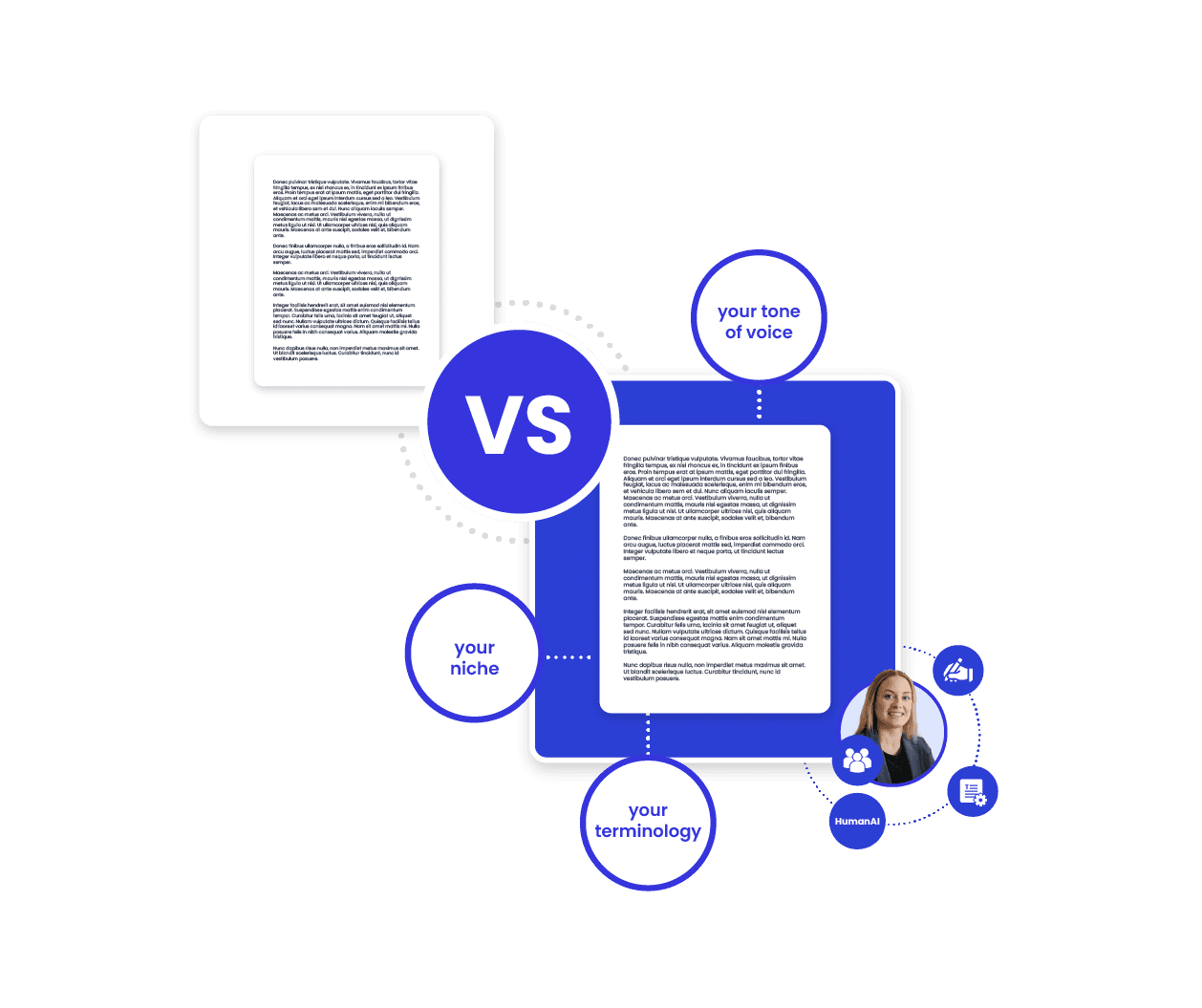LANGUAGES
Professional Japanese translations
Combining AI and human expertise for context-based translations that maintain your brand’s voice. EasyTranslate makes on-brand Japanese translation fast, easy and affordable.

LANGUAGES
Professional Japanese translations
Combining AI and human expertise for context-based translations that maintain your brand’s voice. EasyTranslate makes on-brand Japanese translation fast, easy and affordable.

THE BEST OF HUMAN AND ARTIFICIAL INTELLIGENCE
EasyTranslate HumanAI combines AI efficiency with human expertise to create context-specific, on-brand translations. With customised AI and strategic translator edits, we deliver Japanese translations that perfectly fit your product, brand and industry. HumanAI means benefitting from the speed and cost-effectiveness of AI and the quality of human translation.
HUNDREDS OF PROFESSIONAL TRANSLATORS
HANDS-ON JAPANESE TRANSLATION SUPPORT

THE BEST OF HUMAN AND ARTIFICIAL INTELLIGENCE
EasyTranslate HumanAI combines AI efficiency with human expertise to create context-specific, on-brand translations. With customised AI and strategic translator edits, we deliver Japanese translations that perfectly fit your product, brand and industry. HumanAI means benefitting from the speed and cost-effectiveness of AI and the quality of human translation.
HUNDREDS OF PROFESSIONAL TRANSLATORS
HANDS-ON JAPANESE TRANSLATION SUPPORT

THE BEST OF HUMAN AND ARTIFICIAL INTELLIGENCE
EasyTranslate HumanAI combines AI efficiency with human expertise to create context-specific, on-brand translations. With customised AI and strategic translator edits, we deliver Japanese translations that perfectly fit your product, brand and industry. HumanAI means benefitting from the speed and cost-effectiveness of AI and the quality of human translation.
HUNDREDS OF PROFESSIONAL TRANSLATORS
HANDS-ON JAPANESE TRANSLATION SUPPORT

See why our customers love us
See why our customers love us
See why our customers love us
What we offer
From smart translations to multilingual text creation from scratch, we offer everything you need to reach your target audiences with authentic content in any language.

HumanAI translations
Automated AI translations with human input where it matters

Team of freelancers
Build a dedicated team of freelance translators and/or copy editors

Content Generation
Let AI write engaging content in any language, fast and at scale

Copy editing
Get human copy editing services for AI-generated content
What we offer
From smart translations to multilingual text creation from scratch, we offer everything you need to reach your target audiences with authentic content in any language.

HumanAI translations
Automated AI translations with human input where it matters

Team of freelancers
Build a dedicated team of freelance translators and/or copy editors

Content Generation
Let AI write engaging content in any language, fast and at scale

Copy editing
Get human copy editing services for AI-generated content
What we offer
From smart translations to multilingual text creation from scratch, we offer everything you need to reach your target audiences with authentic content in any language.

HumanAI translations
Automated AI translations with human input where it matters

Team of freelancers
Build a dedicated team of freelance translators and/or copy editors

Content Generation
Let AI write engaging content in any language, fast and at scale

Copy editing
Get human copy editing services for AI-generated content
Translations for any industry
Whether you work in marketing, tech, fashion or any other field, we deliver tailored translations that fit your brand’s industry.
E-commerce
Healthcare
Tourism
E-learning
Software
Gaming
Legal

E-commerce & Retail translations
Translate your e-commerce website and webshop for global expansion. E-commerce localisation builds customer trust, enhances customer experiences and provides a competitive edge. EasyTranslate HumanAI provides well-translated product descriptions, improved SEO and on-brand communication making sure your brand reaches its target audience wherever they are.
Translations for any industry
Whether you work in marketing, tech, fashion or any other field, we deliver tailored translations that fit your brand’s industry.
E-commerce
Healthcare
Tourism
E-learning
Legal
Software
Gaming

E-commerce & retail translations
Translate your e-commerce website and webshop for global expansion. E-commerce localisation builds customer trust, enhances customer experiences and provides a competitive edge. EasyTranslate HumanAI provides well-translated product descriptions, improved SEO and on-brand communication making sure your brand reaches its target audience wherever they are.
Your data is safe with us
Protecting your files and information is our top priority. Your data remains safe, compliant and under your control.

Single sign-on

Annual ISO 27001 audit

GDPR compliance
Your data is safe with us
Protecting your files and information is our top priority. Your data remains safe, compliant and under your control.

Single sign-on

Annual ISO 27001 audit

GDPR compliance
Your data is safe with us
Protecting your files and information is our top priority. Your data remains safe, compliant and under your control.

Single sign-on

Annual ISO 27001 audit

GDPR compliance

Japanese vs YOUR Japanese
There’s Japanese and then there’s your Japanese. Using generic machine translation tools will generate generic translations. With EasyTranslate, you get context-based translations that are in line with your industry and your brand as well as your terminology and tone of voice. We customise your own AI model that is trained in your preferred communication style. On top of that, we loop in translators of your choice who are well-briefed on your content preferences. The result? Not just generic Japanese translation but Japanese content that speaks your brand’s language.

Japanese vs YOUR Japanese
There’s Japanese and then there’s your Japanese. Using generic machine translation tools will generate generic translations. With EasyTranslate, you get context-based translations that are in line with your industry and your brand as well as your terminology and tone of voice. We customise your own AI model that is trained in your preferred communication style. On top of that, we loop in translators of your choice who are well-briefed on your content preferences. The result? Not just generic Japanese translation but Japanese content that speaks your brand’s language.
INTEGRATE YOUR APPS WITHOUT CODING
EasyTranslate plugs right into your favourite CMS, PIM and other apps. Our no-code plugins automatically translate into the right website sections, styles and formats. Whether you use Shopify, WordPress, Figma or any other system, we probably have the plugin you’re looking for. If not, reach out and we’re happy to develop the integration that fits your needs.
FAST AND EASY JAPANESE TRANSLATIONS
SMART TRANSLATIONS TOOLS
WORRY-FREE TRANSLATION SERVICES

INTEGRATE YOUR APPS WITHOUT CODING
EasyTranslate plugs right into your favourite CMS, PIM and other apps. Our no-code plugins automatically translate into the right website sections, styles and formats. Whether you use Shopify, WordPress, Figma or any other system, we probably have the plugin you’re looking for. If not, reach out and we’re happy to develop the integration that fits your needs.
FAST AND EASY JAPANESE TRANSLATIONS
SMART TRANSLATIONS TOOLS
WORRY-FREE TRANSLATION SERVICES

INTEGRATE YOUR APPS WITHOUT CODING
EasyTranslate plugs right into your favourite CMS, PIM and other apps. Our no-code plugins automatically translate into the right website sections, styles and formats. Whether you use Shopify, WordPress, Figma or any other system, we probably have the plugin you’re looking for. If not, reach out and we’re happy to develop the integration that fits your needs.
FAST AND EASY JAPANESE TRANSLATIONS
SMART TRANSLATIONS TOOLS
WORRY-FREE TRANSLATION SERVICES

Professional translation for any language
Whether you’re looking for Spanish, German or Chinese translation, we provide it all. With AI that’s adaptable to any language and hundreds of native-speaking translators, we deliver high-quality translation projects across all languages.
Professional translation for any language
Whether you’re looking for Spanish, German or Chinese translation, we provide it all. With AI that’s adaptable to any language and hundreds of native-speaking translators, we deliver high-quality translation projects across all languages.
Ready for top-quality Japanese translations?
Let’s talk and figure out how we can provide the best Japanese translations for you.
Ready for top-quality Japanese translations?
Let’s talk and figure out how we can provide the best Japanese translations for you.
LangOps Platform
Services
Titangade 9-11, 2200 Copenhagen N, Denmark
Tel: +45 70 20 55 50 | hello@easytranslate.com
Copyright Ⓒ 2025 EasyTranslate A/S. All rights reserved.
VAT: DK33240562
LangOps Platform
Services
Titangade 9-11, 2200 Copenhagen N, Denmark
Tel: +45 70 20 55 50 | hello@easytranslate.com
Copyright Ⓒ 2025 EasyTranslate A/S. All rights reserved.
VAT: DK33240562
LangOps Platform
Services
Titangade 9-11, 2200 Copenhagen N, Denmark
Tel: +45 70 20 55 50 | hello@easytranslate.com
Copyright Ⓒ 2025 EasyTranslate A/S. All rights reserved.
VAT: DK33240562



















